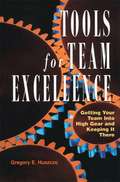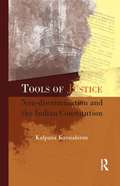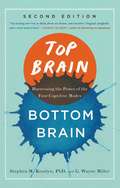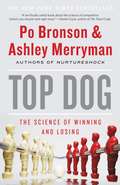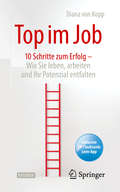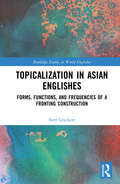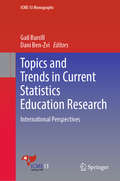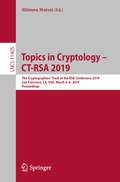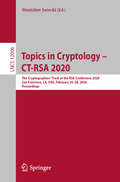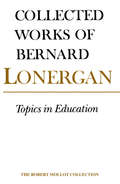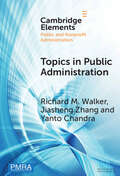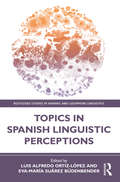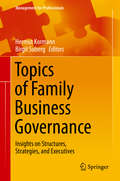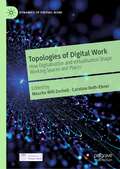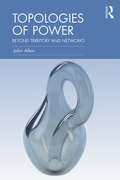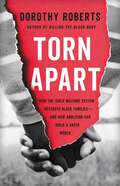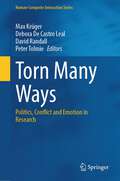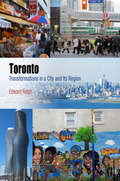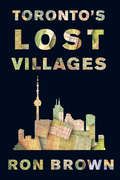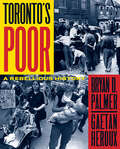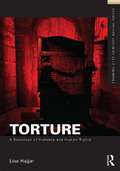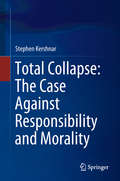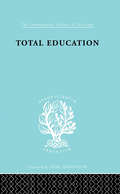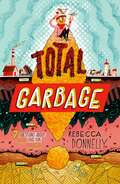- Table View
- List View
Tools for Team Excellence: Getting Your Team into High Gear and Keeping it There
by Gregory E. HuszczoIn Tools for Team Excellence, author Gregory Huszczo describes how readers can foster the seven key components of effective teams: specific targets, appropriate talent, clear responsibilities, efficient procedures, constructive relationships, active reinforcement, and diplomatic ties with other parts of the organization. Packed with practical team training exercises, this volume provides comprehensive information on building, assessing, and improving team performance. Huszczo examines each component and provides the strategies and techniques needed to ensure team and organizational effectiveness.
Tools of Justice: Non-discrimination and the Indian Constitution
by Kalpana KannabiranIn the years since independence, the Indian subcontinent has witnessed an alarming rise in violence against marginalized communities, with an increasing number of groups pushed to the margins of the democratic order. Against this background of violence, injustice and the abuse of rights, this book explores the critical, ‘insurgent’ possibilities of constitutionalism as a means of revitalising the concepts of non-discrimination and liberty, and of reimagining democratic citizenship. The book argues that the breaking down of discrimination in constitutional interpretation and the narrowing of the field of liberty in law deepen discriminatory ideologies and practices. Instead, it offers an intersectional approach to jurisprudence as a means of enabling the law to address the problem of discrimination along multiple, intersecting axes. The argument is developed in the context of the various grounds of discrimination mentioned in the constitution — caste, tribe, religious minorities, women, sexual minorities, and disability. The study draws on a rich body of materials, including official reports, case law and historical records, and uses insights from social theory, anthropology, literary and historical studies and constitutional jurisprudence to offer a new reading of non-discrimination. This book will be useful to those interested in law, sociology, gender studies, politics, constitutionalism, disability studies, human rights, social exclusion, etc.
Tools to Change Your Organization: The Change Leadership Collection (2 Books)
by John P. Kotter John J. GabarroThis digital collection, curated by Harvard Business Review, includes John P. Kotter's Leading Change, With a New Preface by the Author, named one of the twenty-five most influential business-management books by TIME.com, and his thought-provoking and practical Managing Your Boss, with John J. Gabarro. Learn how to lead transformational change in your organization as well as how to build a healthy, productive bond with your boss-one of the most crucial working relationships you'll have in your career.
Top Brain, Bottom Brain: Surprising Insights into How You Think
by G. Wayne Miller Stephen KosslynOne of the world&’s leading neuroscientists teams up with an accomplished writer to debunk the popular left-brain/right-brain theory and offer an exciting new way of thinking about our minds.For the past fifty years, popular culture has led us to believe in the left-brain vs. right-brain theory of personality types. Right-brain people, we&’ve been told, are artistic, intuitive, and thoughtful, while left-brain people tend to be more analytical, logical, and objective. It would be an illuminating theory if it did not have one major drawback: It is simply not supported by science. Dr. Stephen M. Kosslyn, who Steven Pinker calls &“one of the world&’s great cognitive neuroscientists,&” explains with cowriter G. Wayne Miller an exciting new theory of the brain. Presenting extensive research in an inviting and accessible way, Kosslyn and Miller describe how the human brain uses patterns of thought that can be identified and understood through four modes of thinking: Mover, Perceiver, Stimulator, and Adaptor. Once you&’ve identified your usual mode of thought, the practical applications are limitless, from how you work with others when you conduct business, to your personal relationships, to your voyage of self-discovery. The second edition of Top Brain, Bottom Brain includes expanded practical applications and highlights how readers can harness the theory to succeed in their own lives.
Top Dog: The Science of Winning and Losing
by Po Bronson Ashley MerrymanIt's a Dog Eat Dog World. Don't Be on the Menu.What are the differences between a winning and losing performance? Why are we able to rise to the challenge one day, but wilt from it the next? Can we in fact become better competitors? In TOP DOG, Po Bronson and Ashley Merryman use cutting edge science to tease out the hidden factors at the core of every great triumph - and every tragic failure. By enabling you to identify your own competitive style, TOP DOG will help you tip the odds of success in your favor. Integrating wisdom from politics, finance, genetics, neuroscience, psychology, military training, sports, economics, education and more, TOP DOG offers counterintuitive, game-changing insights into the nature of competition, such as: Why the home field advantage in sports is just as relevant in diplomacy and deal-making That women are better at judging risk, while men are better at ignoring it - and how this plays out on K Street and Wall Street Why younger siblings are more competitive than first-borns, and how early-childhood influences shape competitive styles forever That the shape of entrepreneurs' hands can be just as revealing as their business plans How a single biochemical can predict a winner before an event has even begun Why discord can be better than harmony, and why stars on a team do deserve special treatment. As President Dwight Eisenhower said, "What counts is not necessarily the size of the dog in the fight-it's the size of the fight in the dog." In TOP DOG, Po Bronson and Ashley Merryman reveal the size of the fight in all of us.
Top im Job - Wie Sie leben, arbeiten und Ihr Potenzial entfalten: 10 Schritte zum Erfolg
by Diana von KoppEinen tollen Job zu haben ist das stärkste Bedürfnis unserer Zeit.Dieses Buch hilft Ihnen Ihr Potenzial auf ein völlig neues Niveau zu heben. Und damit in Ihrem Job erfolgreich zu sein. Wie Smartes Arbeiten heute gelingt, zeigt Ihnen dieses Buch.Lernen Sie:als Arbeitnehmer, Ihre Karriere besser zu managen. Ihren Stärken entsprechend Bedingungen zu gestalten, in denen Sie Ihr Potenzial bestmöglich entfalten und erfolgreich werden in dem was Sie lieben.als Coach, Potenziale und Talente methodisch zu erschließen und nach wissenschaftlich fundierten Modellen ideal zu fördern.als Führungskraft, Weichen neu zu stellen, Potenziale zu entdecken und in einem agilen Prozess systematisch auf Erfolgskurs zu bringen.Zur AutorinDiplompsychologin Diana von Kopp ist Management-Coach, Bestseller-Autorin und CEO des hrtech HRInnovators. Sie entwickelt Lösungen für innovatives Human Resource Management, gibt Kurse für Führungskräfte und coacht Unternehmer. Wesentliche Erfolgs-Faktoren hat sie zusammengefasst in: 10 Schritte zum Erfolg.
Topicalization in Asian Englishes: Forms, Functions, and Frequencies of a Fronting Construction (Routledge Studies in World Englishes)
by Sven LeuckertThis monograph is the first comprehensive study of topicalization in Asian second-language varieties of English and provides an in-depth analysis of the forms, functions, and frequencies of topicalization in four Asian Englishes. Topicalization, that is, the sentence-initial placement of constituents other than the subject, has been found to occur frequently in the English spoken by many Asians, but so far the possible reasons for this have never been scrutinized. This book closes this research gap by taking into account the structures of the major contact languages, the roles of second-language acquisition and politeness as well as other factors in order to explain why topicalization is highly frequent in some varieties such as Indian English and much less frequent in other varieties such as Hong Kong English. In addition to exploring major and minor forces involved in explaining the frequency of topicalization, the forms and functions of the feature are assessed. Central questions addressed in this regard are the following: Which syntactic constituents tend to be topicalized the most and the least frequently? Which discourse effects does topicalization achieve? How can we approach topicalization methodologically? And, lastly, which influence do language processing and production have on topicalization?
Topics and Trends in Current Statistics Education Research: International Perspectives (ICME-13 Monographs)
by Gail Burrill Dani Ben-ZviThis book focuses on international research in statistics education, providing a solid understanding of the challenges in learning statistics. It presents the teaching and learning of statistics in various contexts, including designed settings for young children, students in formal schooling, tertiary level students, and teacher professional development. The book describes research on what to teach and platforms for delivering content (curriculum), strategies on how to teach for deep understanding, and includes several chapters on developing conceptual understanding (pedagogy and technology), teacher knowledge and beliefs, and the challenges teachers and students face when they solve statistical problems (reasoning and thinking). This new research in the field offers critical insights for college instructors, classroom teachers, curriculum designers, researchers in mathematics and statistics education as well as policy makers and newcomers to the field of statistics education. Statistics has become one of the key areas of study in the modern world of information and big data. The dramatic increase in demand for learning statistics in all disciplines is accompanied by tremendous growth in research in statistics education. Increasingly, countries are teaching more quantitative reasoning and statistics at lower and lower grade levels within mathematics, science and across many content areas. Research has revealed the many challenges in helping learners develop statistical literacy, reasoning, and thinking, and new curricula and technology tools show promise in facilitating the achievement of these desired outcomes.
Topics in Cryptology – CT-RSA 2019: The Cryptographers' Track at the RSA Conference 2019, San Francisco, CA, USA, March 4–8, 2019, Proceedings (Lecture Notes in Computer Science #11405)
by Mitsuru MatsuiThis book constitutes the refereed proceedings of the Cryptographer's Track at the RSA Conference 2019, CT-RSA 2019, held in San Francisco, CA, USA, in March 2019. The 28 papers presented in this volume were carefully reviewed and selected from 75 submissions. CT-RSA is the track devoted to scientific papers on cryptography, public-key to symmetric-key cryptography and from crypto- graphic protocols to primitives and their implementation security.
Topics in Cryptology – CT-RSA 2020: The Cryptographers’ Track at the RSA Conference 2020, San Francisco, CA, USA, February 24–28, 2020, Proceedings (Lecture Notes in Computer Science #12006)
by Stanislaw JareckiThis book constitutes the refereed proceedings of the Cryptographer's Track at the RSA Conference 2020, CT-RSA 2020, held in San Francisco, CA, USA, in February 2020. The 28 papers presented in this volume were carefully reviewed and selected from 95 submissions. CT-RSA is the track devoted to scientific papers on cryptography, public-key to symmetric-key cryptography and from crypto-graphic protocols to primitives and their implementation security.
Topics in Education: The Cincinnati Lectures of 1959 on the Philosophy of Education, Volume 10
by Bernard Lonergan Robert Doran, S.J. Frederick Crowe, S.J.Bernard Lonergan devoted much of his life's work to developing a generalized method of inquiry, an integrated view which would overcome the fragmentation of knowledge in our time. In Topics in Education Lonergan adapts that concern to the practical needs of educators. Traditionalist and modernist notions of education are both criticized. Lonergan attempts to work out, in the context of the human good and the 'new learning,' the rudiments of a philosophy of education based on his well-known discovery of norms in the unfolding of intelligent, reasonable, and responsible consciousness. He explores how the scientific revolution has changed ways of understanding reality, and examines the implications of this revolution for education. Topics in Education, the first publication of his 1959 lectures, follows Lonergan on his early explorations of human development, studies the theories of Jean Piaget and others, and concludes with his own original ideas in the realms of ethics, art, and history.
Topics in Public Administration: Perspectives from Computational Social Sciences and Corpus Linguistics (Elements in Public and Nonprofit Administration)
by Richard M. Walker Jiasheng Zhang Yanto ChandraThis inductive examination of the topics in the public administration literature using computational social science and corpus linguistics (17 journals, N=12,760 articles, 1991–2019) reveals a new landscape of public administration topics, changes in topics over time and their distribution: • Topic modelling of the stock of the whole corpus identifies 50 topics: the top ten topics included health care, federal government, performance management, environmental regulation, HRM and networks and accounted for just over a third of scholarship between 1991–2019. • Focal topics identified in individual journals identified similarities with popular topics in the whole corpus – networks, health care, HRM – and less frequently examined topics including gender and diversity and partnerships. • Analysis of topics over time shows a substantial flow in topics moving from a country and practice focus in the early stages of our study period to concepts such as governance, networks and citizens in the late stages (2015–2019).
Topics in Spanish Linguistic Perceptions (Routledge Studies in Hispanic and Lusophone Linguistics)
by Ortiz-López, Luis AlfredoTopics in Spanish Linguistic Perceptions brings together the most current research on linguistic perceptions of varieties of Spanish. The book includes articles from a range of expert contributors using different methodologies and looking at diverse sociolinguistic settings. Readers will gain a rich understanding of the importance of linguistic perceptions and the societal attitudes they are linked to. Readers will also gain insight into the interplay between socioeconomic groups, and educational and linguistic norms and the perception of non-standardized forms of Spanish. The volume highlights the relationship between language and social perceptions and will be of particular interest to researchers and students in Hispanic linguistics, sociophonetics, and sociolinguistics.
Topics of Family Business Governance: Insights on Structures, Strategies, and Executives (Management for Professionals)
by Hermut Kormann Birgit SubergThis book focuses on the role of the board in family businesses and specifically on processes and topics of strategic importance. It comprises all the relevant topics which need to be addressed on a regular basis such as strategy development, financial management, and leadership. The pros and cons of each issue are elaborated. This is one of the few books which addresses family businesses from governance systems to the role of executives. The diverse set of examples carefully collected by the authors and an in-depth discussion on the topics provide readers with valuable insights to broaden and enrich the effectiveness of governance.
Topologies of Digital Work: How Digitalisation and Virtualisation Shape Working Spaces and Places (Dynamics of Virtual Work)
by Mascha Will-Zocholl Caroline Roth-EbnerThis book provides a unique contribution to the controversial discussion that surrounds the digitalisation and virtualisation of work. With a focus on the new formation of space and place, it critically discusses the idea that places in the context of work are increasingly losing their importance, and becoming more arbitrary with new technical possibilities. Theoretical considerations that deal conceptually with the understanding of space and work are taken into account, as well as empirical results from different professional and work fields across various regions of our globalised world. The book is applicable to researchers and students of sociology of work, media and communications, organization studies, workplace studies, labour process studies, economics, human geography, anthropology and learning sciences.Chapter 1, 4 and 11 are available open access under a Creative Commons Attribution 4.0 International License via link.springer.com.
Topologies of Power: Beyond territory and networks (CRESC)
by John AllenTopologies of Power amounts to a radical departure in the way that power and space have been understood. It calls into question the very idea that power is simply extended across a given territory or network, and argues that power today has a new found ‘reach’. Topological shifts have subtly altered the reach of power, enabling governments, corporations and NGOs alike to register their presence through quieter, less brash forms of power than domination or overt control. In a world in which proximity and distance increasingly play across one another, topology offers an insight into how power remains continuous under transformation: the same but different in its ability to shape peoples’ lives. Drawing upon a range of political, economic and cultural illustrations, the book sets out a clear and accessible account of the topological workings of power in the contemporary moment. It will be invaluable for both students and academics in human geography, politics, sociology, and cultural studies.
Torn Apart: How the Child Welfare System Destroys Black Families--and How Abolition Can Build a Safer World
by Dorothy RobertsAn award-winning scholar exposes the foundational racism of the child welfare system and calls for radical change Many believe the child welfare system protects children from abuse. But as Torn Apart uncovers, this system is designed to punish Black families. Drawing on decades of research, legal scholar and sociologist Dorothy Roberts reveals that the child welfare system is better understood as a &“family policing system&” that collaborates with law enforcement and prisons to oppress Black communities. Child protection investigations ensnare a majority of Black children, putting their families under intense state surveillance and regulation. Black children are disproportionately likely to be torn from their families and placed in foster care, driving many to juvenile detention and imprisonment. The only way to stop the destruction caused by family policing, Torn Apart argues, is to abolish the child welfare system and liberate Black communities.
Torn Many Ways: Politics, Conflict and Emotion in Research (Human–Computer Interaction Series)
by David Randall Peter Tolmie Max Krüger Debora De Castro LealThis edited collection brings together a range of experiences from the field, largely in the context of CSCW and HCI. It focuses specifically on the experiences of people who have worked in difficult, tense, delicate and sometimes conflictual and dangerous settings. The tensions faced by researchers and, more importantly, how they manage to deal with them are often under-remarked. Unlike the bulk of published ethnographic work, the chapters in this book deal more explicitly with the various practical problems that researchers with varying degrees of experience face. Our aim in this book is to give a voice to researchers who have sometimes contended with unexpected issues and who sometimes have had to face them on their own. We explore incidents which may entail emotional conflict, embarrassment and shame, feelings of isolation, arguments with other members of a team, political pressures, and ideological confusions, to name but a few. Senior figures in research laboratories and elsewhere may provide intellectual direction and support but may not always recognise the personal and problematic nature of qualitative enquiry undertaken by relatively inexperienced researchers. The chapters examine feelings of isolation, the difficulty of ‘taking sides’, the negotiation of personal, ethical, and political pressures in the field, and dealing with conflicting visions of what the research should be about. The book is a resource for those embarking on the challenges of working in unfamiliar or difficult settings and moreover should act as a reminder to academics who might have forgotten the practical issues that researchers can face and how they deal with them.
Toronto
by Edward RelphExtending a hundred miles across south-central Ontario, Toronto is the fifth largest metropolitan area in North America, with the highest population density and the busiest expressway. At its core old Toronto consists of walkable neighborhoods and a financial district deeply connected to the global economy. Newer parts of the region have downtown centers linked by networks of arterial roads and expressways, employment districts with most of the region's jobs, and ethnically diverse suburbs where English is a minority language. About half the population is foreign-born--the highest proportion in the developed world. Population growth because of immigration--almost three million in thirty years--shows few signs of abating, but recently implemented regional strategies aim to contain future urban expansion within a greenbelt and to accommodate growth by increasing densities in designated urban centers served by public transit.Toronto: Transformations in a City and Its Region traces the city's development from a British colonial outpost established in 1793 to the multicultural, polycentric metropolitan region of today. Though the original grid survey and much of the streetcar city created a century ago have endured, they have been supplemented by remarkable changes over the past fifty years in the context of economic and social globalization. Geographer Edward Relph's broad-stroke portrait of the urban region draws on the ideas of two renowned Torontonians--Jane Jacobs and Marshall McLuhan--to provide an interpretation of how its current forms and landscapes came to be as they are, the values they embody, and how they may change once again.
Toronto's Lost Villages
by Ron BrownExplore the vestiges of the hamlets and villages that have been swallowed up by Toronto’s relentless growth. Over the course of more than two centuries, Toronto has ballooned from a muddy collection of huts on a swampy waterfront to Canada’s largest and most diverse city. Amid (and sometimes underneath) this urban agglomeration are the remains of many small communities that once dotted the region now known as Toronto and the GTA. Before European settlers arrived, Indigenous Peoples established villages on the shore of Lake Ontario. With the arrival of the English, a host of farm hamlets, tollgate stopovers, mill towns, and, later, railway and cottage communities sprang up. Vestiges of some are still preserved, while others have disappeared forever. Some are remembered, though many have been forgotten. In Toronto’s Lost Villages, all of their stories are brought back to life.
Toronto’s Poor: A Rebellious History
by Bryan D. Palmer Gaétan HérouxToronto’s Poor reveals the long and too often forgotten history of poor people’s resistance. It details how people without housing, people living in poverty, and unemployed people have struggled to survive and secure food and shelter in the wake of the many panics, downturns, recessions, and depressions that punctuate the years from the 1830s to the present. Written by a historian of the working class and a poor people’s activist, this is a rebellious book that links past and present in an almost two-hundred year story of struggle and resistance. It is about men, women, and children relegated to lives of desperation by an uncaring system, and how they have refused to be defeated. In that refusal, and in winning better conditions for themselves, Toronto’s poor create the possibility of a new kind of society, one ordered not by acquisition and individual advance, but by appreciations of collective rights and responsibilities.
Torture: A Sociology of Violence and Human Rights (Framing 21st Century Social Issues)
by Lisa HajjarTorture is indisputably abhorrent. Why, you might ask, would you even want to think or read about torture? That is a very good question, and one this book addresses in a compelling and enlightening way. Torture is a very important issue, not least because millions of people around the world have been subjected to this odious practice—and many are enduring torture right now as you read these words.
Total Collapse: The Case Against Responsibility and Morality
by Stephen KershnarThis book argues that there is no morality and that people are not morally responsible for what they do. In particular, it argues that what people do is neither right nor wrong and that they are neither praiseworthy nor blameworthy for doing it. Morality and moral responsibility lie at the heart of how we view the world. In our daily life, we feel that people act rightly or wrongly, make the world better or worse, and are virtuous or vicious. These policies are central to our justifying how we see the world and treat others. In this book, the author argues that our views on these matters are false. He presents a series of arguments that threaten to undermine our theoretical and practical worldviews. The philosophical costs of denying moral responsibility and morality are enormous. It does violence to philosophical positions that many people took a lifetime to develop. Worse, it does violence to our everyday view of people. A host of concepts that we rely on daily (praiseworthy, blameworthy, desert, virtue, right, wrong, good, bad, etc.) fail to refer to any property in the world and are thus deeply mistaken. This book is of interest to philosophers, lawyers, and humanities professors as well as people interested in morality, law, religion, and public policy.
Total Education: A Plea for Synthesis (International Library of Sociology)
by M.L. JacksFirst Published in 1998. Routledge is an imprint of Taylor & Francis, an informa company.
Total Garbage: A Messy Dive into Trash, Waste, and Our World
by Rebecca DonnellyTotal Garbage by Rebecca Donnelly dives into the messy truth about trash, garbage, waste, and our world—it's a fact-filled and fascinating illustrated middle grade environmental read!Trash has been part of human societies since the beginning. It seems like the inevitable end to the process of making and using things—but why? In this fascinating account of the waste we make, we'll wade into the muck of history and explore present-day STEM innovations to answer these important questions: What is garbage?Where does our garbage come from?Why do we make so much garbage?Where does our garbage go?What can we learn from our garbage?How bad is our garbage problem?How can we do better?Rebecca Donnelly tackles the extraordinary, the icky, and the everyday, helping us see how our choices, personal and societal, impact our world and our planet—and encouraging us make a change.Back matter includes a timeline of the history of waste management, selected bibliography, and index."clear, engaging writing. . . [and] whimsical, informative, detailed teal-tone line drawings add to a captivating and important book. . . A fact-filled and fascinating dumpster dive of a book." —Kirkus Reviews, starred review on Total Garbage"this book makes garbage fun to read about and is a great choice for browsable nonfiction shelves and curricular tie-ins" —School Library Journal on Total Garbage"Readers will need strong stomachs for some of the nauseating facts Donnelly dishes in her deep dumpster dive, but they’ll emerge a heartier lot that’s armed with awareness and the tools to clean up their acts, environmentally speaking. " —Booklist on Total Garbage
